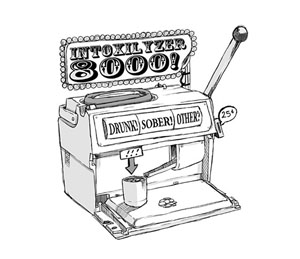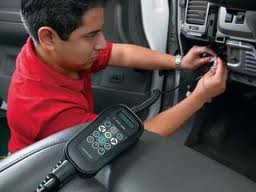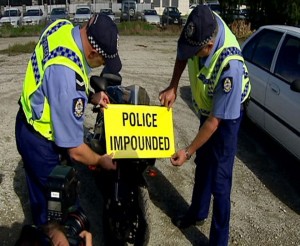 Since 2010, all drivers convicted of DWI in New York must use an ignition interlock device on their vehicle for a minimum of six months. The device will not allow the car to start if alcohol, which can be as low as .025%, is detected in the driver’s breath. This zero tolerance policy started as a provision under New York’s “Leandra’s Law”, also known as the Child Passenger Protection Act.
Since 2010, all drivers convicted of DWI in New York must use an ignition interlock device on their vehicle for a minimum of six months. The device will not allow the car to start if alcohol, which can be as low as .025%, is detected in the driver’s breath. This zero tolerance policy started as a provision under New York’s “Leandra’s Law”, also known as the Child Passenger Protection Act.
State government records are showing that many convicted DWI offenders are evading the issue of installing an ignition interlock device on their vehicle, and a review of the records since the law was implemented two years ago show that as many as 23,000 motorists have avoided the installation of the device, often by simply selling their car or signing ownership over to a family member.
But convicted DWI offenders are still operating vehicles without the device, and in some cases while they are intoxicated. Some are still driving their original vehicle and some are being caught driving their friends’ cars.
Case in point: Nicholas Santaniello of West Seneca was convicted of DWI and complied with the law by having the ignition interlock device installed in his vehicle. The device requires monthly calibrations to check proper operation and to document any ‘fails’ on the device. For one of these calibrations, Santaniello arrived in his friend’s car, and Santaniello’s car was driven by his friend. Law enforcement was tipped off and when they arrived and tested Santaniello for alcohol, they discovered he had enough alcohol in his system to prevent his car from starting through the device. He was charged with operating a vehicle without an interlock device and operating a vehicle in violation of a restricted license. The friend was charged with facilitating operation to a person court-ordered to use an interlock device and operating without a license.
The compliance with the new ignition interlock device law has been just 30%. Each county in New York has an agency which monitors compliance and informs judges about the drivers who refuse to abide by the rules, or drivers who have failed to start their vehicle with the device.
State lawmakers are considering options on how to address the loophole with the law. Long Island Republican Charles J. Fuschillo Jr. has suggested that offenders who do not participate in the interlock device program wear “transdermal alcohol monitoring devices” such as the ankle bracelet.
Gov. Cuomo has successfully pushed for tougher drunk driving legislation recently, and tighter restrictions on licensing is a way the administration is handling repeat offenders.
New, innovative technology, such as SmartStart’s ignition interlock devices with Photo ID modules, can be a way to skirt the issue of friends helping friends bypass the device nefariously.
 A petition was filed with Florida’s Division of Administrative hearings last week challenging the use of the breath-testing machine, the Intoxilyzer 8000, as a reliable device in drunk driving prosecutions.
A petition was filed with Florida’s Division of Administrative hearings last week challenging the use of the breath-testing machine, the Intoxilyzer 8000, as a reliable device in drunk driving prosecutions.
 Georgia has been overdue for DUI law reform, and in April the State Senate expanded SB 236, an Act which allows repeat DUI offenders to have more flexibility in their driving privileges.
Georgia has been overdue for DUI law reform, and in April the State Senate expanded SB 236, an Act which allows repeat DUI offenders to have more flexibility in their driving privileges.
 A new Alabama law took effect September 1 that will affect people convicted of DUI with a BAC above 0.15%. The ignition interlock device is a machine installed in a vehicle to test the BAC of the driver, and many states have laws that make these devices mandatory after a person has been convicted of a DUI.
A new Alabama law took effect September 1 that will affect people convicted of DUI with a BAC above 0.15%. The ignition interlock device is a machine installed in a vehicle to test the BAC of the driver, and many states have laws that make these devices mandatory after a person has been convicted of a DUI.
 Bernalillo County in Arizona passed the Vehicle Seizure and Forfeiture Ordinance, an ordinance that is very similar to a law in the city of Albuquerque. Commissioner Wayne Johnson said the ordinance will seize the vehicles of repeat DWI offenders. Johnson said that if you have one DWI conviction and are arrested for another DWI, then your vehicle can be seized. Johnson said that counties surrounding Albuquerque have become a safe haven for drunk driving offenders, who have learned the laws and began using county instead of city roads. He repeated a story he heard from the city’s hearing examiner about a “gentleman who blew through a stop sign and went down the street and would not pull over until he got outside the city limit.” As the current law stands, a repeat offender who crosses over the river and pulls over when they are in the county would be allowed to keep their car. The new program is projected to cost the county $2 million and the Commissioner says the county is reportedly having discussions with the city about how to work together to save money. The number of cars brought to the city’s seizure lot is expected to increase and the vehicles which get auctioned off will help pay for the program. The new law is set to go into effect October 26, 2012.
Bernalillo County in Arizona passed the Vehicle Seizure and Forfeiture Ordinance, an ordinance that is very similar to a law in the city of Albuquerque. Commissioner Wayne Johnson said the ordinance will seize the vehicles of repeat DWI offenders. Johnson said that if you have one DWI conviction and are arrested for another DWI, then your vehicle can be seized. Johnson said that counties surrounding Albuquerque have become a safe haven for drunk driving offenders, who have learned the laws and began using county instead of city roads. He repeated a story he heard from the city’s hearing examiner about a “gentleman who blew through a stop sign and went down the street and would not pull over until he got outside the city limit.” As the current law stands, a repeat offender who crosses over the river and pulls over when they are in the county would be allowed to keep their car. The new program is projected to cost the county $2 million and the Commissioner says the county is reportedly having discussions with the city about how to work together to save money. The number of cars brought to the city’s seizure lot is expected to increase and the vehicles which get auctioned off will help pay for the program. The new law is set to go into effect October 26, 2012. Ed Gruchalla is a member of the North Dakota House of Representatives whose bipartisan suppport of a
Ed Gruchalla is a member of the North Dakota House of Representatives whose bipartisan suppport of a  New Jersey will receive
New Jersey will receive
